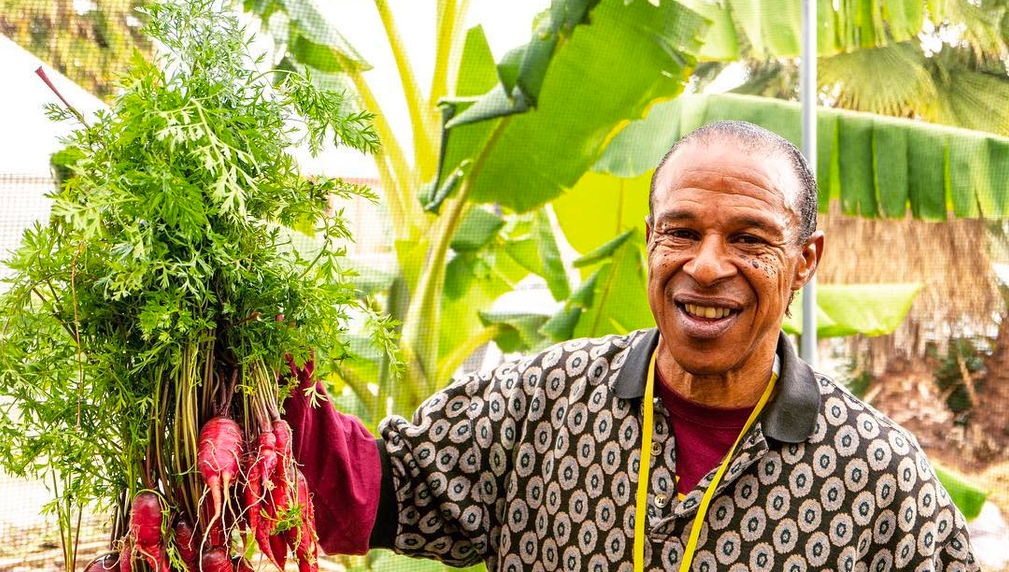Food for Life
GrowGood's Food for Life program will provide a healing space and therapy on our urban farm for 600 homeless individuals who are experiencing poverty, drug addictions, and mental health issues, including PTSD. With this award, GrowGood will serve 600 unduplicated individuals--35% of participants are veterans, often with PTSD.

What is the primary issue area that your application will impact?
Housing and Homelessness
In which areas of Los Angeles will you be directly working?
Central LA
East LA
In what stage of innovation is this project, program, or initiative?
Expand existing project, program, or initiative
What is your understanding of the issue that you are seeking to address?
All of those served by GrowGood live below the federal poverty line. Over 70% are people of color, who have been disproportionately impacted by poverty, incarceration, and drugs. In addition to battling the challenges of substance addiction, mental health issues, and the risk of incarceration, the participants are often termed as "hard to employ". They lack access to fresh food and green spaces and affordable housing. GrowGood is located in the city of Bell--a "food desert", according to the U.S. Department of Agriculture--adjacent to the Salvation Army Bell Shelter. Food deserts are described as geographic areas where residents' access to affordable, healthy food options is restricted or non-existent due to the lack of grocery stores and farmers' markets within a convenient distance. GrowGood's green space is an anomaly, being located in the center of an industrial complex bordered by a main artery freeway, a large cement manufacturer, and various industrial buildings and concerns.
Describe the project, program, or initiative this grant will support to address the issue.
The Food for Life program brings together professionals who create a trauma-informed setting in which participants--many with co-occurring disorders- engage in nature-based therapy, yoga, and meditation. The classes focus on nature study, exercise, body-mind connection and movement, mindfulness meditation, nutrition, and diet education. The core competencies of the program include nature-based therapy, trauma-informed activities, and holistic self-care, led by a bi-lingual staff member and a staff member with a background in Horticultural Therapy, guided by a Clinical Psychologist. Food for Life is set against the backdrop of GrowGood's various farm-based programs. This program is often a person's first introduction to GrowGood. Once a group of participants enrolls in Food for Life, they begin their weekly classes as a step towards self-care and healing. The trauma-informed setting becomes a safe space to address co-occurring disorders. Most participants also benefit from the meals from the fresh produce supplies from GrowGood to the shelter kitchen. Often, Food for Life participants move on to the Transitional Employment Program and eventually to permanent employment.
Describe how Los Angeles County will be different if your work is successful.
GrowGood's vision is to make Los Angeles a better place to live for all who call it home. Since its founding in 2011, Growgood has transformed an empty, barren industrial lot into a 1.5-acre ecologically integrated farm that produces over 10,000 pounds per year of nutritious organically grown food for the adjacent Salvation Army Bell Shelter and has provided employment and job training opportunities for unhoused individuals. GrowGood's model is set against the health-oriented backdrop of urban agriculture, interlaced with food-based education, employment pathways, nutrition, lifestyle coaching and immersion in a therapeutic green space. GrowGood cares for the land and people; offers a therapeutic respite and a place for volunteering; provides job training on the farm to shelter residents; and creates community. Since its inception, GrowGood's efforts have been recognized for its unique approach by the UCLA, USC Marshall, and Makechange Awards as an initiative "shaping LA's future".
What evidence do you have that this project, program, or initiative is or will be successful, and how will you define and measure success?
GrowGood measures its impact against the following goals: 1) to provide fresh, organic produce to the kitchen of Bell Shelter, which serves 6,000 meals a week for its 500 homeless participants, 2) to provide training and employment opportunities on the farm and in a culinary education program for people with the greatest barriers to employment, and 3) to provide therapeutic green space and activities for whole health healing as well as respite for thoughtful reflection. GrowGood tracks the number of participants in each cohort of Food for Life. During the grant year, GrowGood will serve 600 individuals. Coupled with our own participant surveys, our partnership with The Salvation Army Bell Shelter Wellness Program Director allows for ongoing input and valuable information as to the overall impact our program is generating on a day-to-day basis, enabling us to adjust and adapt accordingly to ever-changing and unpredictable circumstances prevalent within the population we serve.
Approximately how many people will be impacted by this project, program, or initiative?
Direct Impact: 600
Indirect Impact: 2,400